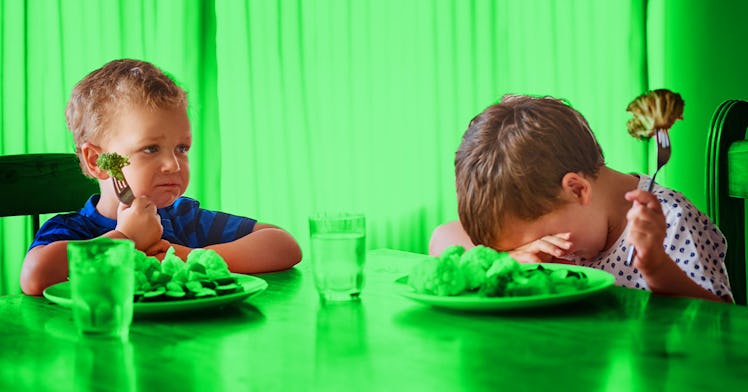New Study Says Forcing Kids to Eat Broccoli Is Quite Literally Torture
Sometimes unreasonable kid behaviors have good reasons — you just don’t know what they are.

Broccoli is a chronic source of conflict at the family dinner table. Parents who are used to the taste of the vegetable are continually frustrated by the apparently unreasonable reactions their children have to what should be a benign bit of greenery. But new research suggests that for some kids, being forced to eat broccoli is as bad as they make it look — the tears and protests and gagging aren’t, in fact, overreactions but biologically motivated. Which suggests that maybe moms and dads need a bit more flexibility and understanding for their kids, both at the dinner table and away from it.
The study in question, published by Australian researchers in the September 20221 issue of the Journal of Agricultural and Food Chemistry sought to understand the reasons for children’s distaste of vegetables called brassicas — which include classic dinner-devilers like broccoli, cauliflower, cabbage and Brussels sprouts. Previous studies have found that enzymes present in adult saliva, specifically cysteine lyases, react to enzymes in brassicas to create putrid, odorific sulphuric compounds in the mouth that are commonly found in nasties like rotting meat. The study authors wondered if children’s saliva could be causing the same results.
The researchers studied 98 parents and their children of the prime broccoli loathing ages of 6 and 8-years-old by adding their spit to raw cauliflower to measure the release in volatile, sulphuric compounds. Subjects were also given blind taste tests of cauliflower to measure their relative revulsion of the veg. The results? Not only did parents and children share similar saliva composition resulting in similar levels of sulphuric compounds, but “significant negative relationships were measured between the amount of in-mouth sulfur volatile production and liking for raw cauliflower in children,” researchers wrote.
In other words, some kids simply can’t help hating veggies like broccoli and brussels sprouts. They are biologically primed to find them disgusting and their body is reacting as parents are literally trying to feed them rotting meat. Gross.
But, then why would parents enjoy these same vegetables? After all researchers found that while parent and child saliva produced the same kind of gross-out compounds, the adults were not as likely to be repulsed. That’s because they got used to it through years of exposure. Kids don’t have a long gustatory history. And children are more sensitive to bitter and sour tastes than adults. It’s kind of a perfect storm.
Does this mean that parents should stop trying to get kids to eat their veggies? No. That would be ridiculous. But it does suggest that there is reason behind what adults sometimes perceive as unreasonable childhood behavior. And in fact, the power struggle at the dinner table is more about a parent’s feeling of control than it is about getting a child to come around to how delicious a Brussels sprout can be.
Still, don’t give up on vegetables. Outside of the genetically-predisposed cruciferous haters, kids can pretty quickly learn to love nutrient-rich greens. Research has found that humans can build up a taste for foods they’re gradually exposed to. Dieticians who work with kids cite this ability in suggesting that children may need to be exposed to a food 10 to 15 times before they will start chowing down. But this constant offering without results requires parental patience and flexibility. And sometimes, it even requires straight-up capitulation to a kid’s tastes.
The fact is that the world is full of vegetables, any number of which a child is bound to like. What does it matter if they’ll only eat lettuce and carrots and refuse broccoli? Make sure every meal has lettuce and carrots. The broccoli just being on the plate counts for exposure. No need to make them choke it down.
As parents, we want what’s best and healthiest for our kids. And we also know that broccoli is one of those things. But what’s counterintuitive is that broccoli won’t be consumed unless the experience is enjoyable. But if it arrives with a corpse taste and some seriously bad parental vibes in the form of guilt, anger and frustration, that’s unlikely to happen.
And this broccoli lesson can be applied more broadly, as well. Unreasonable childhood behaviors often have reasons, regardless of whether we know what they are. Parental responses to those behaviors become equally unreasonable when they are built on leveraging power and asserting authority. Sometimes the best way forward is to offer understanding and alternatives and then try again later. Keep it from being a big deal and a kid may eventually bring the Brussel sprouts to Thanksgiving. It’ll just take patience and time.
This article was originally published on